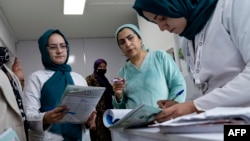In early December, the Taliban regime in Afghanistan banned women from gaining a medical education, including nursing and midwifery. Since male medical personnel is forbidden from treating women, this edict means that in the not-too distant future, Afghanistan’s women will have no access to any medical treatment whatsoever.
December 10th marked the 76th anniversary of the Universal Declaration of Human Rights. “Ironically,” said U.S. Permanent representative at the U.N., Linda Thomas-Greenfield, “Afghanistan was one of the 48 original countries that adopted the Declaration, which applies all rights and freedoms equally – to men and women.”
“But today, the Taliban is issuing archaic edict after edict after edict designed to deprive women and girls of fundamental rights, of the chance to learn, and live, and thrive with freedom and dignity,” she said.
“Most recently, the Taliban banned women’s access to medical training, which means no access to medical care. How will women’s health care needs be met in the future if there are no qualified women doctors, nurses, dentists, and midwives? And male doctors are not allowed to treat women.”
“This new restriction defies logic and could represent a death sentence for Afghan women and girls in dire need of potentially lifesaving medical treatment. It will have an impact on every mother, every unborn infant – boys and girls – and on the future of Afghanistan,” said Ambassador Thomas-Greenfield.
“This is not cultural and it’s not religious. It is unfathomable. It is sick. It is heartless. It means these men – Taliban – are sentencing their mothers who birthed them, their sisters, their wives, their own daughters, to die before their eyes if they become ill.”
But the fact is that the Taliban is disastrously bad for all Afghan people. It has been in power for little more than 3 years but in that time, the country spiraled into a humanitarian disaster. Today, 97 percent of the population lives below the poverty line.
“We are also deeply concerned by the dire humanitarian situation in Afghanistan, with nearly 23 million Afghans, more than half of Afghanistan’s population, in need of humanitarian assistance as a result of food insecurity, malnutrition, widespread displacement, and contamination from explosive ordinance.”
“My message to the Afghan people, and to Afghan women in particular, is this,” said Ambassador Thomas-Greenfield. “We stand with you, in solidarity. In the face of this repression, we and our partners remain steadfast in our firm commitment to support the Afghan people.”






